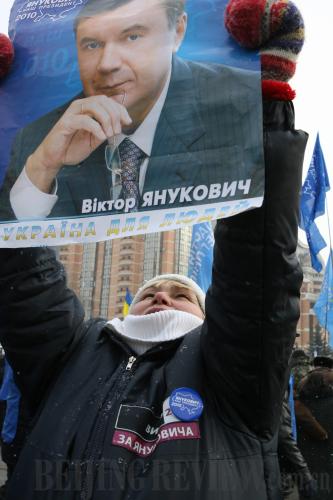|
 |
|
CAUSE FOR CELEBRATION: Viktor Yanukovych's supporters celebrate his presidential election victory in Kiev on February 8 (MU LIMING) |
After a hard-fought campaign—and a narrowly won election—opposition leader Viktor Yanukovych was at last sworn in as Ukraine's new president on February 25.
Despite the abundant speculation before the ballots were opened, Ukrainian people showed the world the new tomorrow they seek through the ousting of President Viktor Yushchenko and Prime Minister Yulia Tymoshenko—both leaders of Ukraine's Orange Revolution.
But this hardly solves the questions at hand for the nation. For instance, while Moscow has made no secret of its desire to include Ukraine into the Russian-led common economic space and customs union, the EU and the United States hope Ukraine continues on its path to Euro-Atlantic integration. As it stands, the world awaits the direction that the new president will choose.
Moreover, Yanukovych faces pressing domestic problems as well. More specifically, the economic difficulties and national unity issues within Ukraine's borders are far more urgent for him than developing stable, beneficial relations with foreign countries.
Domestic politics
Establishing a unity government will be a key task for Yanukovych. According to the Ukrainian Constitution, the government implements Ukraine's domestic and foreign policies, while the parliamentary majority has the right to nominate a prime minister.
Although the president decides the country's diplomatic, military and security affairs, his policies cannot be effectively carried out without the full cooperation of the government.
Before the presidential election, Yanukovych said that, were he to win the election, he would dissolve the parliament and form a new majority led by his party, the Party of Regions.
This would fashion a new political dynamic featuring a joint leadership headed by both the president and the prime minister.
Judging by the current pattern of political power emerging in Ukraine, Yanukovych appears to possess the mandate to do so. Ukraine's parliament passed a no-confidence motion on March 3 against Tymoshenko, forcing her and her government to resign.
Tymoshenko, who refused to recognize Yanukovych's presidential victory, has indicated that she would rather join the opposition instead of joining a unity government. Thus Yanukovych must now bypass her while establishing a majority coalition in the parliament.
During the first round of the presidential election, the three defeated candidates—Sergey Tigipko, Arseniy Yatsenyuk and Viktor Yushchenko—won a total of 25 percent of the votes.
The three are poised to represent a key force affecting the future of Ukraine's power structure. They have also expressed willingness to cooperate with the new president.
Hopefully, Yanukovych will successfully establish a new government through a coalition with the three ex-candidates, as well as the Communist Party of Ukraine and the Ukrainian People's Party.
Economic tasks
Not surprisingly, the difficulties associated with the world financial crisis proved a significant factor in Yanukovych's presidential victory.
Swept up in the maelstrom, the Ukrainian people pinned high hopes on Yanukovych to reverse this difficult situation. His ability to tame domestic markets while creating a lasting economic stability, therefore, is a must if he wishes to maintain his place in office.
Overall, he faces a series of major tasks. For instance, he must address Kiev's debt crisis. As of October 2009, according to government statistics, Ukraine's foreign debt had reached $105 billion. This figure was equivalent to 90 percent of its GDP—dangerously higher than the internationally accepted norm.
This sovereign debt crisis is a ticking time bomb hidden within the structure of the Ukrainian economy—one that threatens to explode at any time in 2010.
Acquiring outside capital is thus the only choice for Yanukovych. And to do so, he needs the full support of the United States and the EU, major stakeholders of the International Monetary Fund (IMF) and the World Bank—entities that can provide the best access to financial support and liquidity.
Meanwhile, as Ukraine's major energy supplier, Russia also profoundly impacts Ukraine's economic and social stability.
More broadly, proper diplomatic relations with the world's major economies may be an important task for Yanukovych in the short term.
Kiev should continue to absorb investments and technology as a mid-term goal. The solution to other domestic problems—including unemployment, industrial restructuring and infrastructure construction—dearly requires such investments.
And in the long term, Yanukovych must bridge cultural and ethnic gaps between the people in the eastern regions and those in the western parts of the country.
Although nearly 20 years have passed since Ukraine declared independence, stark cultural and ethnic fissures remain embedded in the hearts and minds of people in both regions. As an independent nation with a new agenda, a greater degree of national unity must be achieved.
| 